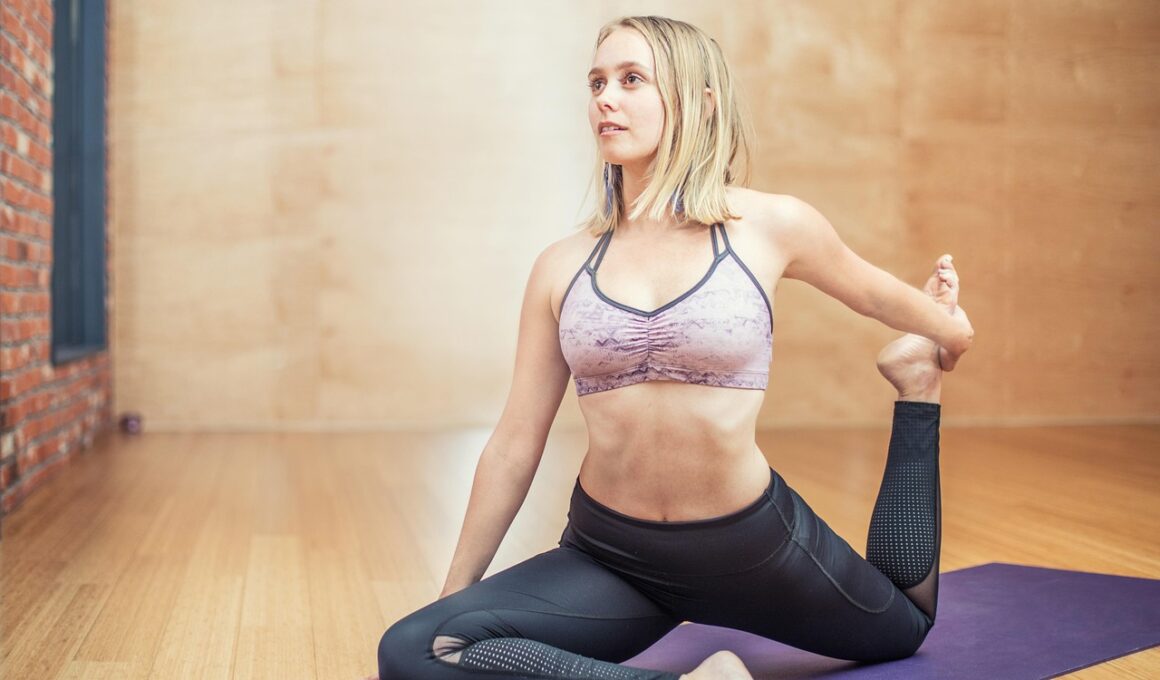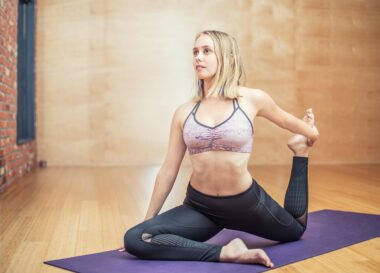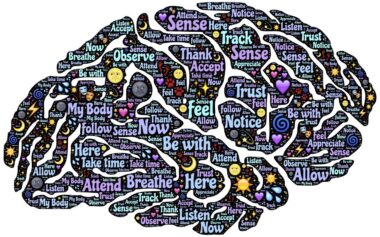Adapted Pilates for Mental Health: Tailoring Workouts to Your Needs
Pilates serves as an excellent method for improving mental health by promoting relaxation and mindfulness. This low-impact exercise routine not only strengthens the body but also focuses on the connection between mind and body. For those dealing with anxiety or depression, adapted Pilates offers tailored workouts that cater to specific mental health needs. Individual sessions can integrate breathing techniques and gentle movements that encourage serene engagement with one’s surroundings. Furthermore, adapting Pilates to suit mental health includes customizing exercises that fit personal goals and physical capabilities. By selecting activities aligning with unique mental states, participants can build both physical resilience and emotional stability. Pilates emphasizes controlled movements, aligning perfectly with therapeutic practices like cognitive behavioral therapy (CBT). The rhythmic nature of Pilates helps in reducing stress levels and promoting a sense of calm. Incorporating elements such as visualizations and affirmations during practice can enhance mindfulness, further amplifying the positive effects on mental health. These personalized adaptations signify an essential step toward wellness, fostering an environment where individuals feel empowered in their journey towards emotional healing and overall well-being.
As mental health awareness grows, more fitness instructors are recognizing the benefits of Pilates in therapeutic contexts. Pilates focuses on building core strength and stability while simultaneously promoting mental awareness. Many practitioners find that engaging in adapted Pilates routines helps them to regulate their emotions more effectively. The exercises can be tailored to challenge physical and mental boundaries in a supportive environment. Techniques like modified movements, guided meditations, and deep breathing can facilitate emotional release, generating a space for introspection. Moreover, group sessions not only create community support but also facilitate shared experiences. Such collective energy can be incredibly healing, allowing individuals to connect with others facing similar challenges. Furthermore, maintaining a disciplined Pilates routine enhances self-esteem, encouraging participants to explore their physical limits while simultaneously nurturing their mental health. Instructors equipped with knowledge about mental health issues can provide motivation, guiding participants through their workouts thoughtfully. By blending traditional Pilates with mental health strategies, practitioners can effectively address emotional and psychological barriers that may arise during their fitness journey. Therefore, adapted Pilates contributes meaningfully to comprehensive wellness strategies focused on improving mental and emotional well-being.
Benefits of Customized Pilates
The implementation of customized Pilates for mental health offers several invaluable benefits. Firstly, adaptations can cater to varying levels of physical ability, ensuring inclusivity and accessibility. This is particularly beneficial for individuals with chronic pain or those recovering from injuries. Mental health improvements through adapted workouts can manifest in various ways, including increased confidence, reduced anxiety levels, and improved emotional regulation. Participants learn to focus their energy on mastering particular movements, which fosters a stronger mind-body connection. This heightened awareness often translates to better stress management in everyday situations. Additionally, regular adaptation of Pilates routines keeps participants engaged and motivated. Progress tracking can further enhance their commitment to mental health goals, as seeing tangible improvements creates a sense of accomplishment. Engaging instructors present innovative approaches to adapt traditional movements that facilitate emotional breakthroughs. Incorporating balance, stability, and flexibility exercises encourages dynamic growth, nurturing not just the body but the mind as well. Ultimately, by recognizing the unique needs of each participant, Pilates instructors can create a personalized journey that champions both physical fitness and psychological resilience, supporting a holistic approach to health.
Incorporating mindfulness into Pilates routines significantly enhances the benefits experienced by participants. Mindfulness refers to being fully present in the moment, which can greatly reduce stress and anxiety. When combined with Pilates, mindfulness practices such as focused breathing, meditation, and visualization come into play. Each movement can be approached with intention, fostering a connection to the body and alleviating negative thought patterns. Practitioners often note that employing mindfulness facilitates deeper concentration during workouts. This allows for a profound understanding of their physical and emotional barriers, promoting self-discovery and personal growth. As participants learn to navigate their physical limitations, they also cultivate resilience in the face of mental health challenges. Moreover, mindfulness techniques can effectively combat rumination and intrusive thoughts commonly associated with anxiety and depression. Emphasizing presence during Pilates not only nurtures emotional release but also creates a supportive environment for growth. Consequently, as individuals progress through adapted routines, they gain the tools necessary to cope with challenges beyond the studio, fostering long-lasting effects on mental health. The combination of mindfulness and adapted Pilates holds transformative potential for anyone seeking to improve both physical fitness and emotional stability.
Engagement and Motivation in Practice
Engagement is crucial for sustaining a consistent Pilates practice focused on mental health. Customized workouts tailored to participants’ preferences foster a sense of ownership over their fitness journeys. When individuals feel ownership, they are more likely to adhere to their routines, leading to improved mental health outcomes. Strategies such as setting personal goals and tracking progress can significantly enhance motivation. Instructors can play a pivotal role in facilitating this engagement by creating a positive environment in which participants feel valued and understood. By providing encouragement and personalized feedback, instructors empower individuals to push through mental and physical barriers. Furthermore, incorporating varied formats such as partnerships, small group sessions, or themed classes can keep the experience fresh and engaging. The social aspect of group classes fosters a sense of community, which can be invaluable for mental well-being. Additionally, introducing gamification elements into Pilates practices also piques interest and increases dedication. Overall, high levels of engagement effectively lead to meaningful improvements in mental health, helping individuals cultivate resilience and encouraging them to take further steps toward maintaining their well-being outside the studio.
Another vital aspect of Pilates for mental health is the emphasis on breathing techniques. Breathing serves as a pivotal element throughout Pilates exercises, allowing participants to enhance their focus and awareness. Harnessing deep, conscious breaths can significantly influence physiological stress responses. Breathing exercises promote relaxation, calm the nervous system, and support mental clarity. When paired with physical movements, effective breathing helps release tension, enabling individuals to engage fully with their workouts. Techniques like diaphragmatic breathing or prolonged exhalation can deepen the benefits of Pilates practice, fostering tranquility and invigoration. Furthermore, familiarizing individuals with their breathing patterns encourages self-regulation during challenging situations in life outside the studio. Participants often find that improved breath control becomes a valuable tool for managing acute stress or anxiety episodes. Through structured breathing practices integrated into Pilates routines, practitioners can create a space for emotional release and introspection. Consequently, adapting Pilates programs to prioritize breath techniques opens the door to lasting mental health benefits. Breathing aids practitioners in cultivating resilience while fostering a deeper understanding of their mind-body connection, proving vital in the pursuit of overall wellness.
Conclusion: A Holistic Approach
In conclusion, adapting Pilates for mental health offers a holistic approach to overall wellness. Personalized routines can effectively address individual needs, fostering a more profound connection between the mind and body. By implementing techniques such as mindfulness, breathing, and intentional movement, practitioners can experience transformative effects on mental health. Moreover, a sense of community and support helps fortify emotional resilience, making challenges more manageable. As the stigma surrounding mental health diminishes, more individuals are finding solace in Pilates as a therapeutic outlet. Engaging with instructors knowledgeable in both Pilates and mental health can maximize the benefits while promoting empowerment through personalized guidance. Additionally, as adaptability remains key, continually assessing and adjusting routines ensures participants remain motivated and engaged. By embracing a tailored approach to Pilates, practitioners can unlock their full potential, discovering newfound flexibility and strength. Ultimately, the journey through adapted Pilates inspires ongoing commitment to mental health and personal growth, proving this practice’s effectiveness in improving the overall quality of life. As individuals recognize their unique needs and barriers, they can reclaim their well-being, reinforcing the significance of Pilates as a vital tool for mental health management.
Whether engaging in group classes or one-on-one sessions, the possibilities for adapted Pilates are extensive. These approaches enhance participants’ resilience to life’s challenges while simultaneously nurturing their mental health. With dedicated practice and appropriate expert guidance, those who partake in Pilates can achieve greater emotional balance and stability. It’s crucial to keep in mind that every journey is unique, and personalized adaptations remain essential for fostering a positive experience. This not only encourages long-term commitment but also facilitates empowerment and strength, marking a pathway towards ongoing self-discovery and well-being.





